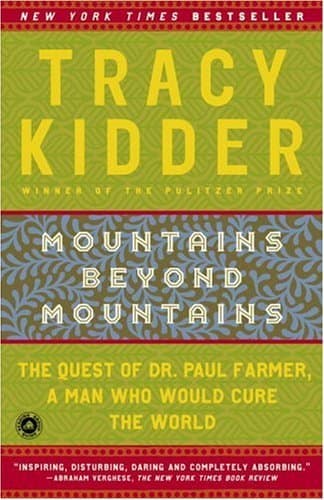This is the second installment of a list of books recommended to us by friends and returned volunteers as well as by the Peace Corps itself. See the first book list post here.
Mountains Beyond Mountains

by Tracy Kidder
This book appears on nearly every list of recommended reading for Peace Corps volunteers. It’s not hard to see why. The story of Dr. Paul Farmer, an infectious disease specialist, is part memoir (he enjoyed a nontraditional childhood that included living in a bus!) and part inspirational journey of a doctor on a mission.
Dr. Farmer is the founder of Partners in Health, an organization that focuses on community-based health care in some of the world’s most impoverished areas. Kidder follows Dr. Farmer on his travels to Haiti and Peru and back to Boston as he treats patients, advocates for affordable medicines, and fundraises. Although Mari has read this book, we’re thinking of re-reading it together to re-learn the lessons of this remarkable individual.
Banker to the Poor

by Muhammad Yunus
Also part memoir and part inspirational journey, this books is the story of Dr. Yunus and his quest to help Bangladesh’s neediest individuals. As a Professor at a university near Jobra, he encouraged his economics students to interview the rural poor of this village in order to understand the local economy.
Through this inquiry, Dr. Yunus learned about the predatory practices of local money lenders and decided to do something about it by taking out a small bank loan on behalf of the poor craftspeople of the village. Thus, microcredit was born and would become the founding principle of Dr. Yunus’s Grameen Bank.
A timely read as Bangladesh’s government has effectively ousted Dr. Yunus from his organization, this book should be required reading for anyone considering working in international development. In 2006, Dr. Yunus and Grameen Bank were awarded the Noble Peace Prize, something the government can never take away.
The World is Flat

by Thomas L. Friedman
Newly updated from its original printing in 2005, this popular (yet controversial) book outlines how globalization is flattening out our world.
Now, neither of us has yet read (or listened to it since we got it as an audio book) so we’ll reserve judgment until we have. It should be of particular interest to Paul, who traveled to India last year to meet with an accounting outsourcing company there.
After we read (or listen) to this, we’ll be sure to check out this recommended reading, too:
The World Is Flat?: A Critical Analysis of New York Times Bestseller by Thomas Friedman.
Here are two more books we have not yet read but that we are excited to read soon:


